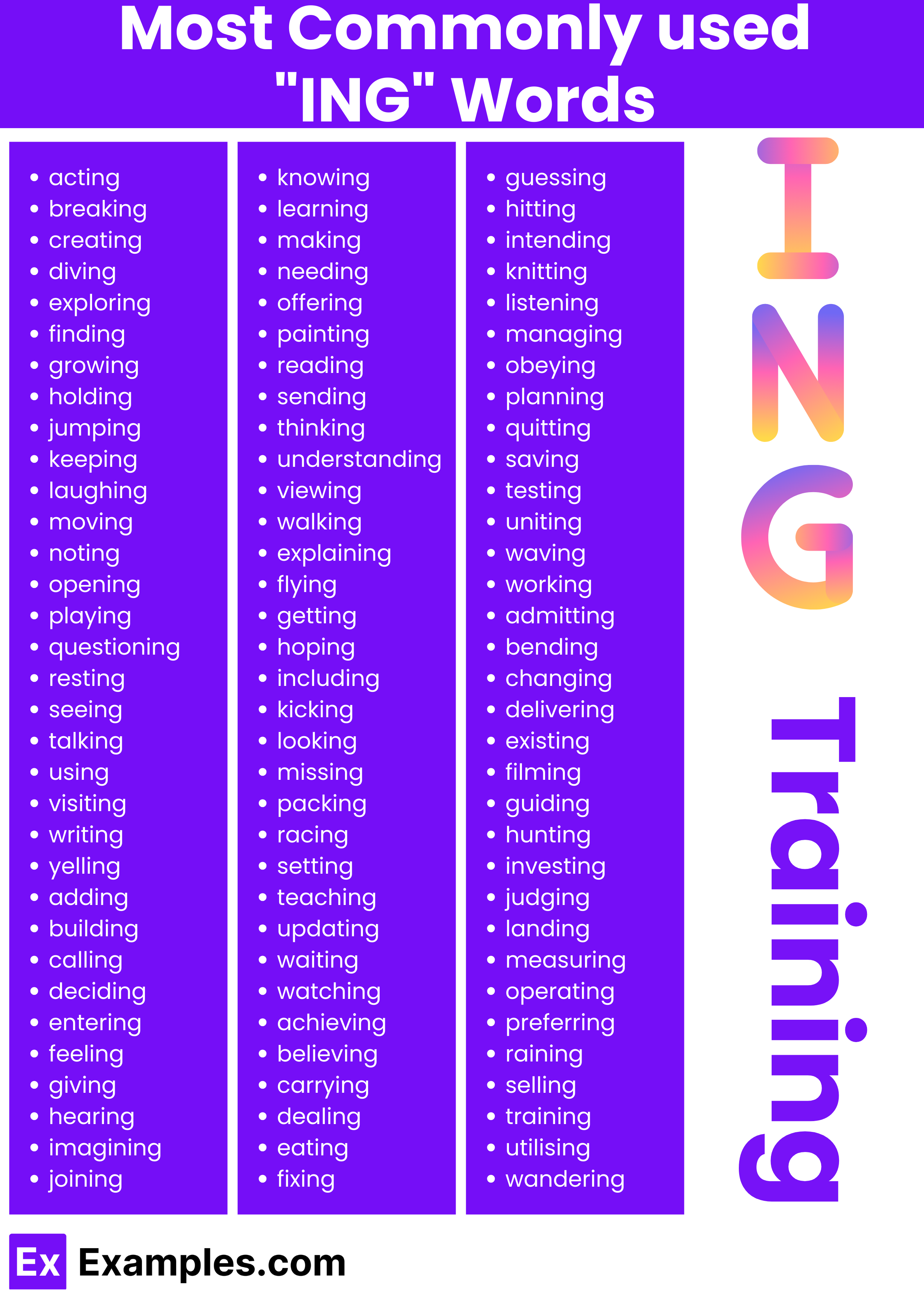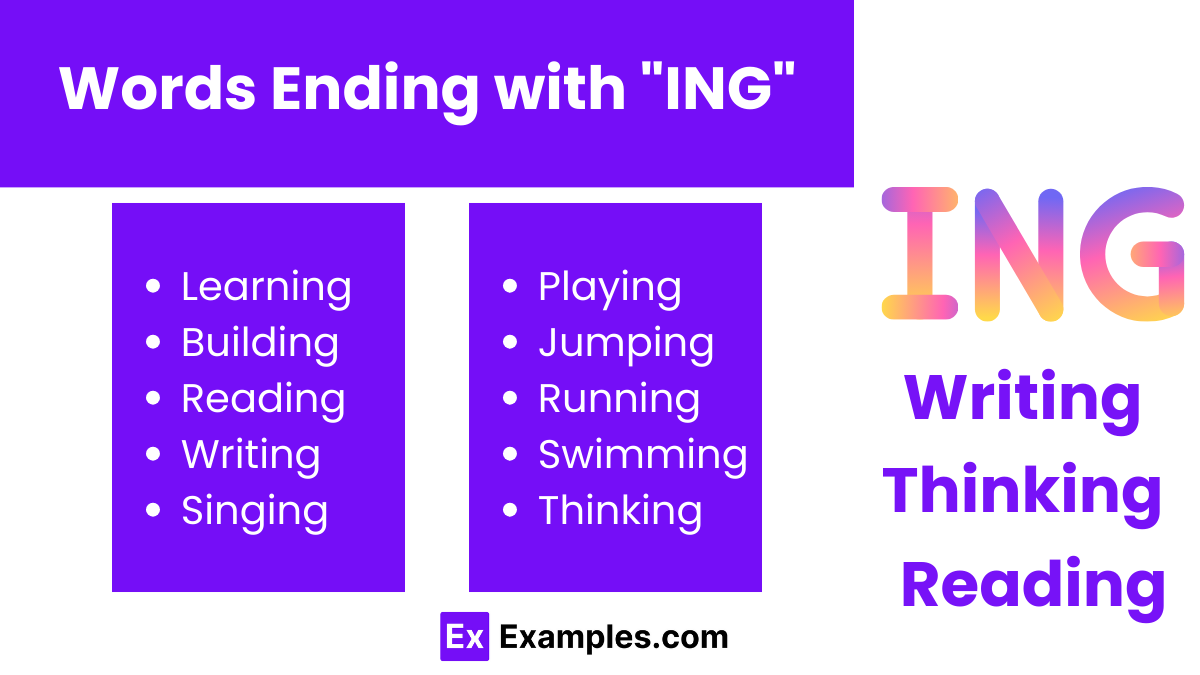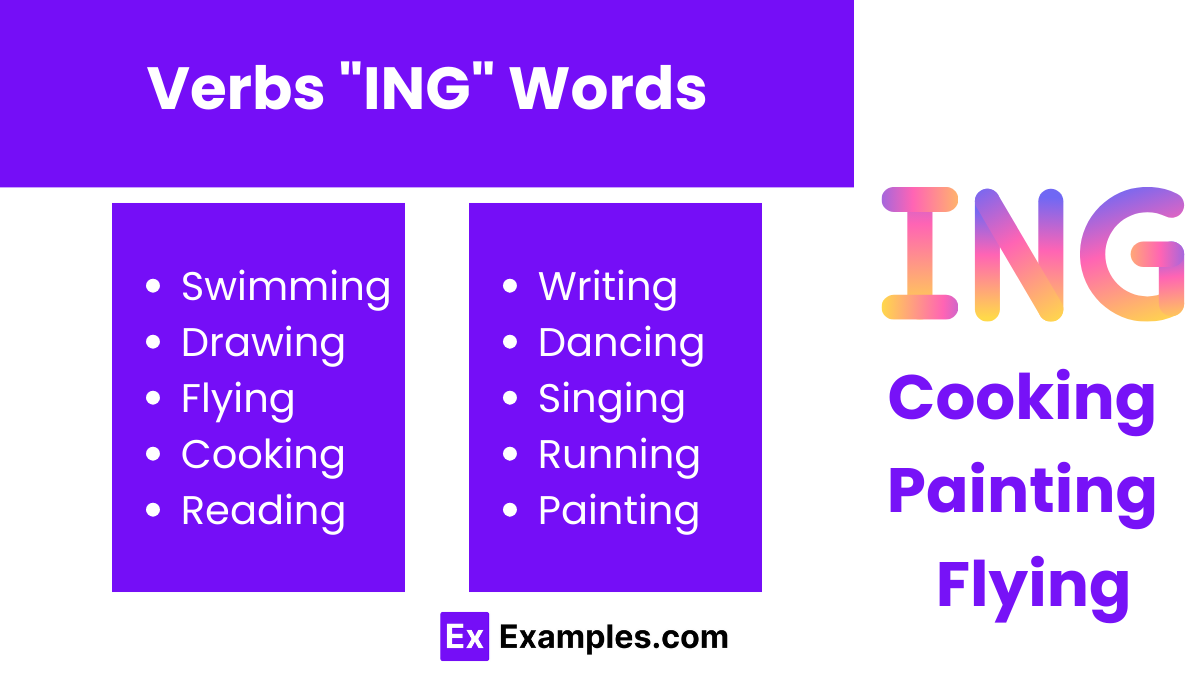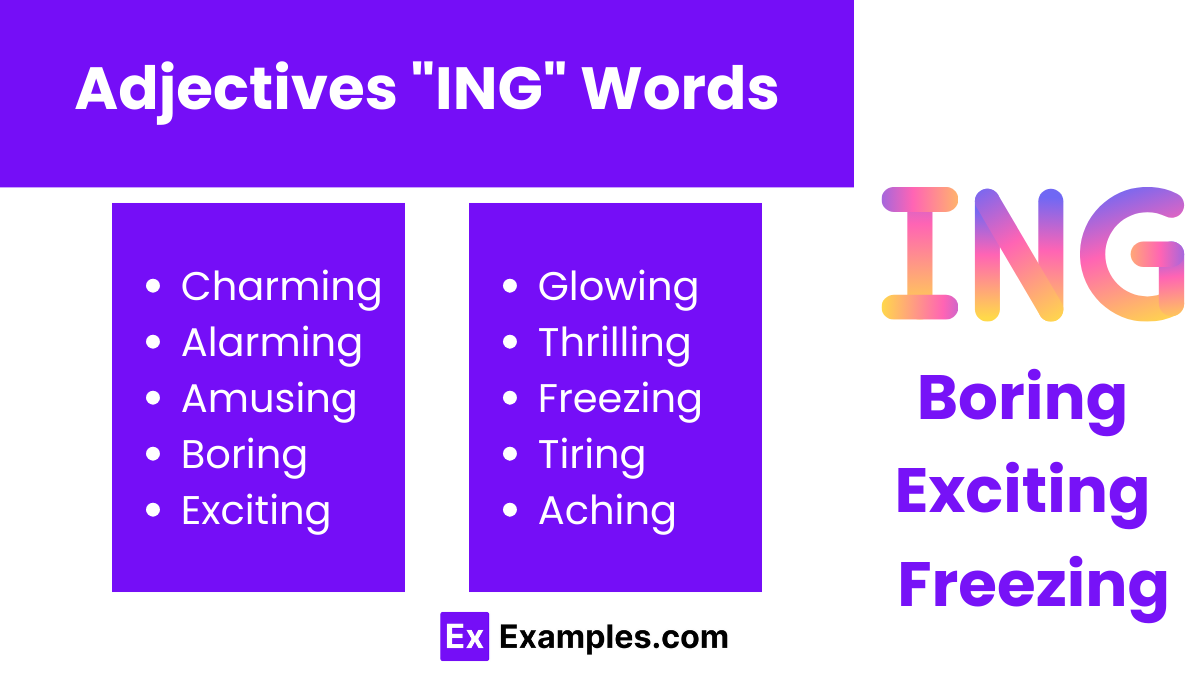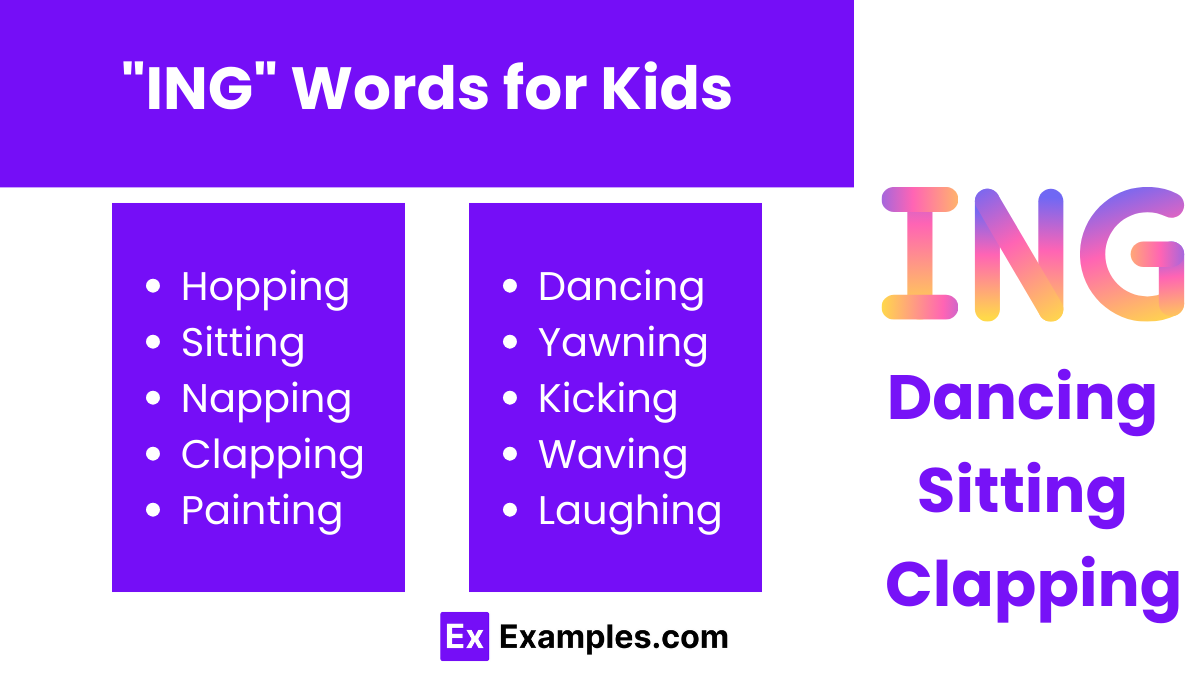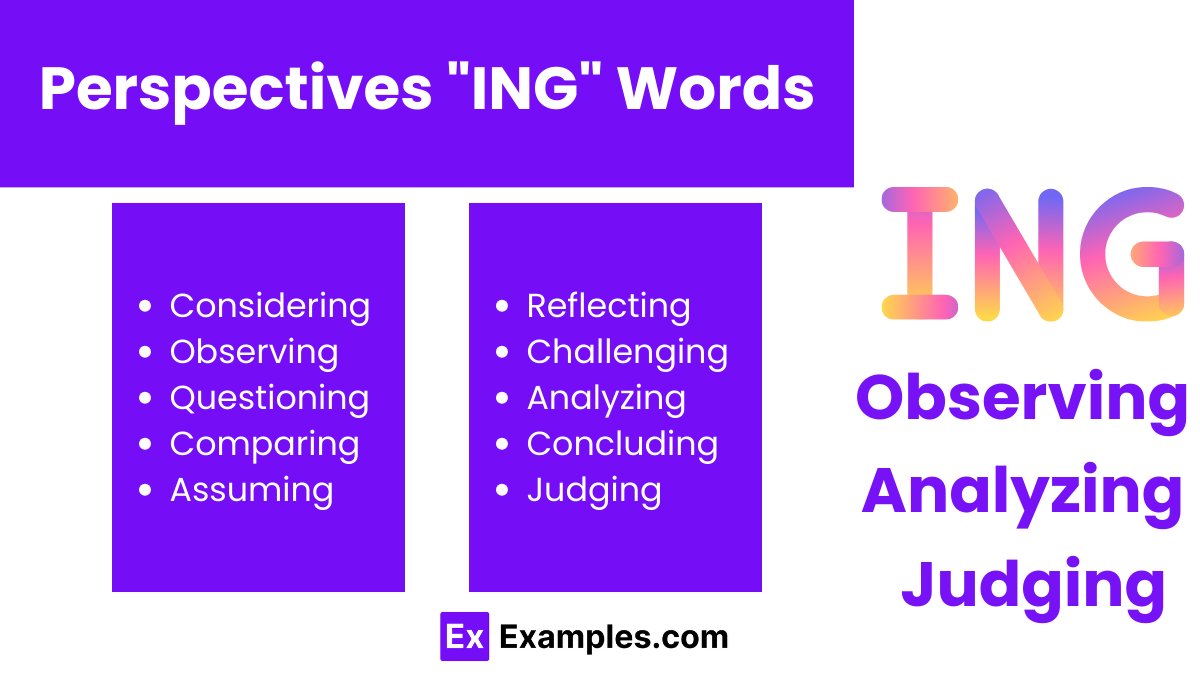450+ ING Words List, Meaning, PDF
Dive into the dynamic world of ‘Ing Words’, a cornerstone of the English language that brings texts to life with action and continuity. These gerunds and present participles are pivotal in crafting sentences that flow with energy and movement, vital for engaging storytelling and clear communication. Whether in creative writing, academic essays, or everyday conversations, ‘Ing Words’ add depth and vibrancy, transforming static language into vivid narratives. Embrace the power of these words to enhance your linguistic expression and captivate your audience.
Download Most Commonly Used ING Words - PDF
100+ Most Commonly used “ING” Words
Creating a comprehensive exploration of the most commonly used “ing” words in the English language, this collection spans a wide array of verbs, adjectives, and gerunds, reflecting the dynamic and versatile nature of “ing” endings. These words are pivotal in forming present participles, gerunds that act as nouns, and adjectives, enriching sentences with actions, descriptions, and states of being. From everyday communication to academic writing, “ing” words infuse language with motion and continuity, making them indispensable for expressing ongoing actions, processes, and qualities. This extensive selection not only serves as an invaluable resource for enhancing vocabulary but also aids in mastering the nuances of English grammar, particularly in verb tense usage and sentence structure. By integrating these words into their lexicon, learners can elevate their language proficiency, enabling more complex and nuanced expression.
| acting | breaking | creating | diving | exploring |
| finding | growing | holding | jumping | keeping |
| laughing | moving | noting | opening | playing |
| questioning | resting | seeing | talking | using |
| visiting | writing | yelling | adding | building |
| calling | deciding | entering | feeling | giving |
| hearing | imagining | joining | knowing | learning |
| making | needing | offering | painting | reading |
| sending | thinking | understanding | viewing | walking |
| explaining | flying | getting | hoping | including |
| kicking | looking | missing | packing | racing |
| setting | teaching | updating | waiting | watching |
| achieving | believing | carrying | dealing | eating |
| fixing | guessing | hitting | intending | knitting |
| listening | managing | obeying | planning | quitting |
| saving | testing | uniting | waving | working |
| admitting | bending | changing | delivering | existing |
| filming | guiding | hunting | investing | judging |
| landing | measuring | operating | preferring | raining |
| selling | training | utilising | wandering | worrying |
| aligning | begging | climbing | designing | earning |
| following | greeting | hosting | instructing | juggling |
| laughing | mentoring | ordering | producing | recording |
| shopping | travelling | vacuuming | warning | zoning |
4 Letter Words Containing “ING”
Delve into the compact yet expressive world of 4 letter words containing ‘ING’. While uncommon, these words play a significant role in the English language, offering a unique blend of brevity and meaning. Ideal for poetry, concise writing, and creative naming, these words can add rhythm and depth to linguistic expressions. Explore this selection to enrich students’ vocabularies and inspire their creativity in using the English language efficiently.
- Ring – A small circular band, typically made of precious metal.
- Sing – To make musical sounds with the voice.
- Ping – A sharp, high-pitched sound.
- King – The male ruler of an independent state.
- Zing – An act of moving swiftly or a quality of excitement.
- Wing – Each of the limbs used by a bird to fly.
- Ling – A type of fish, or heather (in British usage).
- Ding – A minor damage or a dent.
- Fing – An informal or dialect term for giving or passing something.
- Ging – An archaic or dialect term, not commonly used in modern English.
5 Letter Words Containing ‘ING”
Explore the versatility of 5 letter words containing ‘ING’. These words are pivotal in expanding students’ vocabulary and understanding of the English language. Perfect for engaging lessons, these words can help illustrate the use of ‘ING’ in various contexts, from verbs to nouns, enhancing both comprehension and expressive abilities. Encourage students to incorporate these words into their writing and speech for more dynamic communication.
- Bring – To take or carry someone or something to a place.
- Swing – To move back and forth or from side to side.
- Cling – To hold on tightly to something.
- Fling – To throw or hurl forcefully.
- Sling – To throw or hit something with a smooth motion.
- Bling – Flashy jewelry or ornamentation (informal).
- Sting – To cause sharp but usually temporary pain.
- Being – Existence or the nature of a person.
- Wring – To twist and compress to force liquid from it.
- Ingle – A domestic fire or fireplace.
6 Letter Words Containing “ING”
Dive into the diverse world of 6 letter words containing ‘ING’. These words are essential for students to understand the dynamic nature of English, where ‘ING’ plays a pivotal role in forming gerunds, participles, and even part of regular nouns and adjectives. By integrating these words into lessons, students can enhance their vocabulary, improve their understanding of grammatical structures, and become more adept at expressing complex ideas and actions.
- Riding – The action of traveling on a horse, bicycle, or motorcycle.
- Singed – Burnt slightly at the edges or surface.
- Bowing – Bending the body as a gesture of respect or thanks.
- Loving – Feeling or showing love or great care.
- Mating – Coming together for reproduction; pairing.
- Racing – Competing in a speed contest.
- Hoping – Having a desire with anticipation for something to happen.
- Waging – Carrying on (a war or campaign).
- Drying – Removing moisture from something.
- Mining – Extracting minerals or other materials from the earth.
7 Letter Words Containing “ING”
Explore the rich tapestry of 7 letter words containing ‘ING’. These words, often more descriptive and specific, are crucial for students to articulate detailed thoughts, processes, and observations. They serve as an invaluable tool for enhancing written and oral expression, enabling students to convey actions, states of being, and ongoing processes with clarity and precision.
- Singing – Producing musical tones with the voice.
- Flinging – Throwing forcefully; tossing.
- Binging – Indulging excessively in an activity, especially eating or drinking.
- Ceiling – The upper interior surface of a room.
- Lingering – Remaining in a place longer than necessary.
- Tilting – Leaning or causing to lean at an angle.
- Weighing – Finding out how heavy (someone or something) is.
- Ringlet – A small ring or loop of hair.
- Dawning – The beginning or first appearance of light in the sky before sunrise.
- Earring – A piece of jewelry worn on the lobe or edge of the ear.
8 Letter Words Containing “ING”
Delve into the intricate world of 8 letter words containing ‘ING’. These words, often embodying complex actions or detailed descriptions, are pivotal for advanced language use. Teaching these words empowers students to narrate with greater depth, describe processes in detail, and engage in more sophisticated discussions about various subjects, from science to literature.
- Swinging – Moving back and forth or from side to side with a free motion.
- Plotting – Planning or scheming something secretly.
- Briefing – A meeting for giving information or instructions.
- Clashing – Coming into conflict or disagreement.
- Flashing – Shining in a bright but brief, sudden, or intermittent way.
- Creeping – Moving slowly and carefully, especially to avoid being heard or noticed.
- Dressing – Putting on clothes or applying a covering or bandage.
- Ejecting – Forcing or throwing something out, typically in a violent or sudden way.
- Frosting – Covering or decorating (a cake, for example) with icing.
- Gleaming – Shining brightly, especially with reflected light.
9 Letter Words Containing “ING”
Dive into the expansive universe of 9 letter words containing ‘ING’. These words, rich in complexity and diversity, are essential for advanced language learners to articulate nuanced ideas and detailed processes. They enable students to express dynamic actions and ongoing states with precision, enhancing both academic and creative writing. Incorporating these words into teaching materials can significantly enrich students’ vocabulary and understanding of English syntax, fostering their ability to communicate complex concepts effectively.
- Beginning – The point in time or space at which something starts.
- Belonging – An affinity for a place or situation.
- Invoicing – The act of providing or sending an invoice.
- Teaching – The occupation, profession, or work of a teacher.
- Inglenook-An “inglenook” refers to a cozy corner or space, typically by a fireplace, often used for relaxation or informal gatherings.
- Assigning – Allocating or designating a task or duty.
- Laughing – Making the spontaneous sounds and movements of the face and body that are the instinctive expressions of lively amusement and sometimes also of contempt or derision.
-
Investing: Allocating resources, typically money or time, with the expectation of future benefits
-
Exploring: Investigating or delving into unknown areas or ideas.
-
Imagining: Forming mental images or concepts, often creatively or speculatively.
10 Letter Words Containing “ING”
Explore the intricate landscape of 10 letter words containing ‘ING’. These words, with their detailed and specific nature, are invaluable for students aiming to refine their linguistic skills. They are particularly useful for expressing detailed actions, complex processes, and descriptive states, broadening the scope of communication. By mastering these words, students can enhance their written and spoken English, enabling them to convey their thoughts with greater clarity and depth.
- Wondering – Desiring to know something; feeling curious.
- Sheltering – Providing a place of cover or protection.
- Traveling – Going from one place to another, typically over a distance of some length.
- Listening – Giving one’s attention to a sound.
- Flourishing – Developing rapidly and successfully; thriving.
-
Exaggering: The act of overstating or embellishing facts or details beyond the truth.
- Brightening – Making or becoming more light.
- Challenging – Inviting competition; difficult and rewarding.
- Harvesting – Gathering a ripe crop from the fields.
- Accounting – The action or process of keeping financial accounts.
11 Letter Words Containing “ING”
Immerse yourself in the world of 11 letter words containing ‘ING’. These words, characterized by their length and complexity, are perfect for advanced English learners to express sophisticated concepts and detailed narratives. They serve as powerful tools for enhancing academic writing, professional communication, and expressive storytelling. Familiarity with these words allows students to navigate complex discussions, write with precision, and articulate thoughts in a nuanced manner.
- Questioning – The action of asking someone questions, especially in an official context.
- Celebrating – Acknowledging (a significant or happy day or event) with a social gathering or enjoyable activity.
- Investigating – Carrying out a systematic or formal inquiry to discover and examine the facts of (an incident, allegation, etc.) so as to establish the truth.
- Contributing – Giving (something, especially money) in order to help achieve or provide something.
- Discovering – Finding (something or someone) unexpectedly or in the course of a search.
- Manufacturing – The making of articles on a large scale using machinery.
- Programming – Writing computer programs.
- Streamlining – Designing or providing with a form that presents very little resistance to a flow of air or water, increasing speed and ease of movement.
- Entertaining – Providing amusement or enjoyment.
- Restricting – Limiting the size, amount, or range of something.
12 Letter Words Containing ‘ING”
-
Satisfyingly: In a manner that brings fulfillment, contentment, or gratification.
- Exaggerating: Overstating or amplifying the truth beyond reality, often for effect.
- Establishing: Setting up or founding something with firmness and permanence.
- Accelerating: The process of increasing speed or rate, often applied in various contexts such as technology, growth, or development.
- Accentuating: Emphasizing or highlighting a particular feature or aspect, drawing attention to its significance.
- Accessioning: The act of formally acquiring or obtaining something, especially referring to the accession of a new member to a group or organization.
- Circumcising: The surgical removal of the foreskin of the penis, typically performed for cultural, religious, or medical reasons.
- Checklisting: The act of creating or following a list of items to be checked off or completed, often used for organization or task management.
- utterflying: The culinary technique of cutting meat, fish, or poultry horizontally and opening it out to resemble the shape of a butterfly, facilitating even cooking.
- Jeopardizing: Putting something at risk or in danger due to actions or decisions, potentially leading to negative consequences.
13 Letter Words Containing “ING”
- Participating: Engaging actively in an activity or event, contributing to its success or outcome.
- Disappointing: Causing feelings of sadness or dissatisfaction due to failing to meet expectations or hopes
-
Understanding: The ability to comprehend or grasp the meaning or significance of something, often empathetically
-
Communicating: The process of conveying information or ideas effectively between individuals or groups
- Encouragingly: In a manner that gives support, hope, or confidence to others, fostering positive attitudes or actions
- Demonstrating: Showing or proving something through actions or examples, providing evidence or clarification
- Complimenting: Offering praise or expressing admiration towards someone for their qualities, actions, or achievements.
- Accomplishing: Successfully completing or achieving a task, goal, or objective through effort and determination.
- Accommodating: Adjusting or adapting to meet the needs or preferences of others.
-
Diagonalizing: The mathematical process of transforming a matrix into a diagonal form, often used in linear algebra for simplification and analysis.
14 Letter Words Containing “ING”
- Exhilaratingly: Describing something that is extremely exciting or invigorating, providing intense pleasure or stimulation.
-
Intimidatingly: In a manner that is likely to make someone feel frightened or overwhelmed, often due to authority or power.
-
Overwhelmingly: In a manner that is overpowering or dominating, leaving little room for other influences or considerations.
-
Rejuvenatingly: Describing something that restores vitality or energy, refreshing or revitalizing.
-
Institutioning: The act of establishing or organizing an institution or system.
-
Demonstratings: Presenting evidence or proof of something through actions or examples.
- Misremembering: Recalling something incorrectly or inaccurately due to memory distortion or error.
- Missionarising: The act of engaging in missionary work or spreading religious beliefs and practices to others
- Overnourishing: Providing an excessive amount of nutrients or food, often leading to negative health effects such as obesity or nutrient imbalances.
-
Recategorizing: The act of reorganizing or classifying items, concepts, or individuals into different categories or groups.
15 Letter Words Containing “ING”
- Differentiating: Identifying or distinguishing the differences between two or more things.
- Understandingly: With empathy or comprehension, grasping the meaning or significance of something
-
Participatingly: Actively engaging or taking part in an activity or event.
-
Proverbialising: The act of turning something into a well-known saying or proverb, often through repetition or popular usage
- Excommunicating: The act of officially excluding someone from participation in the rituals and privileges of a religious community.
- Fractionalising: The process of dividing something into smaller, distinct parts or fractions
- Industrializing: The process of developing industries or industrial infrastructure in a region or country.
- Interconnecting: Establishing connections or links between multiple entities or systems to enable communication or interaction.
- Overlengthening: The act of making something longer than necessary or beyond standard measurements.
- Overmultiplying: Excessively increasing or reproducing something beyond reasonable limits or requirements.
Words Ending with “ING”
Embark on a linguistic journey with our curated selection of words ending with ‘ING’. These dynamic words are foundational to the English language, denoting actions, processes, or states of being. Perfect for enhancing narrative depth and descriptive clarity, ‘ING’ words are essential for effective storytelling and communication. From writing compelling stories to articulating complex ideas, these words add vitality and motion to sentences, making them indispensable for learners aiming to enrich their vocabulary and linguistic expression.
- Learning – Acquiring knowledge or skills through study or experience.
- Building – Constructing something by putting parts or materials together.
- Reading – Looking at and comprehending the meaning of written or printed matter.
- Writing – Marking coherent words on paper or another medium.
- Singing – Making musical sounds with the voice.
- Playing – Engaging in an activity for enjoyment rather than a serious purpose.
- Jumping – Propelling oneself into the air.
- Running – Moving at a speed faster than a walk.
- Swimming – Propelling oneself through water using the limbs.
- Thinking – Using thought or rational judgment.
Verbs “ING” Words
Delve into the dynamic world of Verbs ING words, where action and continuity take center stage. These words, formed by adding “ing” to the base form of verbs, are essential for constructing the present participle and gerund forms in English, depicting actions in progress or states of being. Ideal for crafting vivid narratives and expressive dialogue, verbs with “ing” endings allow for a more immersive and engaging storytelling experience. By incorporating these words into their vocabulary, students can enhance their writing and speaking, bringing scenes and emotions to life with movement and depth.
- Swimming – Moving through water by moving the body or parts of the body.
- Drawing – Producing an image or diagram by making lines and marks on paper.
- Flying – Moving through the air using wings or through the action of the wind.
- Cooking – Preparing food for eating by applying heat.
- Reading – Looking at and comprehending the meaning of written or printed matter.
- Writing – Composing text or creating written work.
- Dancing – Moving rhythmically to music, typically following a set sequence of steps.
- Singing – Producing musical tones with the voice.
- Running – Moving at a speed faster than a walk, never having both feet on the ground at the same time.
- Painting – Applying paint to a surface, or creating an artistic work with paint.
Adjectives “ING” Words
Explore the descriptive realm of Adjectives ING words, where characteristics and states are vividly portrayed. These words, often derived from verbs, provide a dynamic way to describe nouns, offering a glimpse into ongoing actions or conditions associated with the subjects. They are particularly useful in setting scenes, characterizing individuals, and painting pictures with words, thereby enriching narratives and discussions. Introducing these adjectives into language learning empowers students to express themselves with greater creativity and specificity, enhancing both their written and spoken English with lively and engaging descriptions.
- Charming – Pleasant or attractive, often in a quaint or delicate way.
- Alarming – Worrying or disturbing; causing concern or fear.
- Amusing – Causing laughter or providing entertainment.
- Boring – Not interesting; tedious.
- Exciting – Causing great enthusiasm and eagerness.
- Glowing – Expressing great praise, or shining with a strong or radiant light.
- Thrilling – Causing excitement and pleasure; exhilarating.
- Freezing – Extremely cold; below the freezing point.
- Tiring – Causing one to feel in need of rest or sleep; wearying.
- Aching – Suffering from a continuous dull pain
“ING” Words for Kids
Introduce young minds to the fun and engaging world of ING words for kids. These words are specially selected for their simplicity and relevance to children’s everyday activities, making them perfect for early language development. By incorporating these words into playful learning, children can easily grasp the concept of ongoing actions, enhancing their ability to express themselves clearly and vividly through both speech and writing.
- Hopping – Jumping on one foot.
- Sitting – Resting with the body supported by the buttocks or thighs.
- Napping – Taking a short sleep.
- Clapping – Striking the palms of the hands together to make a sound.
- Painting – Applying color to a surface using a brush.
- Dancing – Moving rhythmically to music.
- Yawning – Involuntarily opening one’s mouth wide and inhaling deeply due to tiredness.
- Kicking – Striking or propelling something with the foot.
- Waving – Moving one’s hand to and fro in greeting or as a signal.
- Laughing – Making the spontaneous sounds and movements of the face that are the instinctive expressions of lively amusement.
Perspectives “ING” Words
Explore the realm of perspectives ING words, a collection designed to offer insights into various viewpoints, attitudes, or approaches to different situations or ideas. These words are instrumental for learners to articulate thoughts that reflect specific stances, opinions, or perceptions, thereby fostering a deeper understanding of subjectivity in communication. Ideal for debates, analytical writing, and reflective thinking, these words encourage learners to express nuanced positions and engage in meaningful discussions.
- Considering – Taking something into account before making a decision.
- Observing – Watching carefully the way something happens or the way someone does something.
- Questioning – Asking questions for information or raising doubts.
- Comparing – Noting the similarity or dissimilarity between.
- Assuming – Accepting something to be true without verification.
- Reflecting – Thinking deeply or carefully about.
- Challenging – Inviting someone to engage in a contest or to question a statement.
- Analyzing – Examining in detail to understand constituents or underlying principles.
- Concluding – Bringing something to an end or deciding after careful thought.
- Judging – Forming an opinion or conclusion about.
In concluding, harnessing the power of “-ing” words amplifies communication, fostering clarity and dynamism. By embracing verbs ending in “-ing,” we invigorate our language, injecting vitality into our expressions. From describing ongoing actions to emphasizing continuous progress, “-ing” words imbue our discourse with vibrancy and fluidity, enriching communication across all domains.




